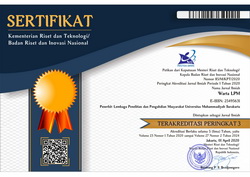Penguatan Metode Computational Thinking untuk Guru Madrasah dalam Rangka Meningkatkan Minat Belajar Siswa Pasca Pandemi Covid-19
DOI:
https://doi.org/10.23917/warta.v26i1.799Keywords:
Computational Thinking, Guru, Madrasah, penguatanAbstract
Madrasah teachers are currently considered to have lower cognitive competence when compared to formal school teachers in general, although this statement is not entirely correct. Researchers have conducted computational thinking training in several madrasa of Central Java Provinces, like MIN 1 Kendal, MTs N 1 Jepara, and MAN 1 Grobogan. Computational Thinking (CT) involves problem solving and system design by breaking it down into several stages that are effective, efficient, and comprehensive, including decomposition, pattern recognition, abstraction, and algorithms which are some of the basic concepts of computer science. The purpose of this study is the implementation of CT by madrasa’ teachers on each lesson to students in order to increase student learning interest. The research method used is blended learning which is a combination of an online course (introduction to Bebras Indonesia and CT) and an onsite course (training on CT and implementation of CT to students). The results showed that there was an increase in the average score of the trainees between the pre-test and post-test of the teachers at MIN 1 Kendal, MTs N 1 Jepara, and MAN 1 Grobogan i.e. 70.23%, 70.01% and 80. 64%, respectively. Furthermore, student testimonials after the implementation of CT in subjects taught by the majority of teachers at 66.79% filled in very interesting so that CT learning was very effective in increasing student learning interest in madrasah.
References
Aadrean. (2011). Ekologi Makan Berang-Berang Cakar Kecil (Aonyx cinereus) di Area Persawahan Kabupaten Padang Pariaman. Universitas Andalas.
Anandhita, V. H., & Dwiardi, A. R. (2018). Peran Teknologi Informasi dalam Menunjang Proses Logistik bagi Penyelenggara Pos di Era Digital (Kasus di Batam, Semarang, Jakarta, dan Mataram). Jurnal Penelitian Pos Dan Informatika, 8(1), 77. https://doi.org/10.17933/jppi.2018.080106
Arimbawa, I. K., Suarjana, I. M., & Arini, N. W. (2017). Pengaruh Penggunaan Ice Breaker Terhadap Motivasi Belajar Siswa Sekolah Dasar. E-Journal PGSD Universitas Pendidikan Ganesha, 1, 1–8. file:///E:/jurnal skripsi/37-10727-1-SM.pdf
Bocconi, S., Chioccariello, A., Dettori, G., Ferrari, A., Engelhardt, K., Kampylis, P., & Punie, Y. (2016). Developing Computational Thinking in Compulsory Education - Implications for policy and practice. In Joint Research Centre (JRC) (Issue June). https://doi.org/10.2791/792158
Cetin, I., & Dubinsky, E. (2017). Reflective abstraction in computational thinking. Journal of Mathematical Behavior, 47(November 2016), 70–80. https://doi.org/10.1016/j.jmathb.2017.06.004
Chlup, D. T., & Collins, T. E. (2010). Breaking the Ice: Using Ice-breakers and Re-energizers with Adult Learners: Https://Doi.Org/10.1177/104515951002100305, 21(3–4), 34–39. https://doi.org/10.1177/104515951002100305
Dhawan, S. (2020). Online Learning: A Panacea in the Time of COVID-19 Crisis. Journal of Educational Technology Systems, 49(1), 5–22. https://doi.org/10.1177/0047239520934018
Endah, S. N., Sarwoko, E. A., Bahtiar, N., Wibowo, A., & Kurniawan, K. (2020). Pembinaan Pola Pikir Komputasi dan Informatika pada Siswa Sekolah Dasar. E-Dimas: Jurnal Pengabdian Kepada Masyarakat, 11(1), 1. https://doi.org/10.26877/e-dimas.v11i1.2317
Engzell, P., Frey, A., & Verhagen, M. D. (2021). Learning loss due to school closures during the COVID-19 pandemic. Proceedings of the National Academy of Sciences of the United States of America, 118(17). https://doi.org/10.1073/PNAS.2022376118
Febriandar, E. I. (2018). Pengaruh Kreativitas Guru Dalam Menerapkan Ice Breaking Dan Motivasi Belajar Terhadap Hasil Belajar Siswa Sekolah Dasar. Briliant: Jurnal Riset Dan Konseptual, 3(4), 498. https://doi.org/10.28926/briliant.v3i4.253
Gadanidis, G. (2016). Artificial Intelligence, Computational Thinking, and Mathematics Education. The International Conference on Information, Communication Technologies in Education, ICICTE, 2016, 83–90.
Garcia, J. D. R., Leon, J. M., Gonzalez, M. R., & Robles, G. (2019). Developing Computational Thinking at School with Machine Learning: An exploration. 2019 International Symposium on Computers in Education, SIIE 2019. https://doi.org/10.1109/SIIE48397.2019.8970124
Hutasoit, R., & Tambunan, D. B. (2018). The Effect of Ice Breaking Technique in Teaching Speaking at the Tenth Grade Students of SMK Dharma Bhakti Siborongborong in Academic Year 2018/2019. International Journal of English Literature and Social Sciences, 3(5), 700–705. https://doi.org/10.22161/ijels.3.5.2
Kallia, M., van Borkulo, S. P., Drijvers, P., Barendsen, E., & Tolboom, J. (2021). Characterising computational thinking in mathematics education: a literature-informed Delphi study. Research in Mathematics Education, 23(2), 159–187. https://doi.org/10.1080/14794802.2020.1852104
Kawuri, K. R., Budiharti, R., & Fauzi, A. (2019). Penerapan Computational Thinking untuk Meningkatkan Kemampuan Berpikir Kritis Siswa Kelas X MIA 9 SMA Negeri 1 Surakarta pada Materi Usaha dan Energi 6. Jurnal Materi Dan Pembelajaran Fisika (JMPF), 9(2), 116–121. https://jurnal.uns.ac.id/jmpf/article/view/38623
Kemendikbud. (2021). Pembelajaran Tatap Muka (PTM) pada Masa Pandemi Covid-19 di SMA.
Koob, C., I. D., Schrö Pfer, K., Coenen Id, M., Kus, S., & Schmidt, N. (2021). Factors influencing study engagement during the COVID-19 pandemic: A cross-sectional study among health and social professions students. https://doi.org/10.1371/journal.pone.0255191
Korkmaz, Ö., & Bai, X. (2019). Adapting computational thinking scale (CTS) for chinese high school students and their thinking scale skills level. Participatory Educational Research, 6(1), 10–26. https://doi.org/10.17275/per.19.2.6.1
Lodi, M., & Martini, S. (2021). Computational Thinking, Between Papert and Wing. Science and Education, 30(4), 883–908. https://doi.org/10.1007/s11191-021-00202-5
Maharani, S., Nusantara, T., Asari, A. R., Malang, U. N., & Timur, J. (2020). Computational thinking pemecahan masalah di abad ke-21 (Issue December). WADE Group National Publishing.
Novrizaldi. (2021, August 6). Penanganan Pandemi Covid-19 perlu Sinergi dan Gotong Royong Semua Pihak | Kementerian Koordinator Bidang Pembangunan Manusia dan Kebudayaan. Kemenko PMK. https://www.kemenkopmk.go.id/penanganan-pandemi-covid-19-perlu-sinergi-dan-gotong-royong-semua-pihak
Nuraini, R. (2020, March 2). Kasus Covid-19 Pertama di Indonesia. Indonesia.Go.Id. https://indonesia.go.id/narasi/indonesia-dalam-angka/ekonomi/kasus-covid-19-pertama-masyarakat-jangan-panik
Rasyid, U. H. A., Masy’ud, B., & Sunkar, A. (2017). Pengelolaan Tingkat Kesejahteraan Berang-Berang Cakar Kecil di Lembaga Konservasi Eksitu ( Management and Level of Asian small-clawed otter ( Aonyx cinereus Illinger , 1815 ) as Display Animal in Indonesia Conservation Institution ). Media Konservasi, 22(1), 92–100.
Rodríguez García, J. D., Moreno-León, J., Román-González, M., & Robles, G. (2020). LearningML: A Tool to Foster Computational Thinking Skills Through Practical Artificial Intelligence Projects: LearningML: una herramienta para fomentar las habilidades de Pensamiento Computacional mediante proyectos prácticos de Inteligencia Artificial. Revista de Educación a Distancia (RED), 20(63). https://doi.org/10.6018/red.410121
Siahaan, M. (2020). Dampak Pandemi Covid-19 Terhadap Dunia Pendidikan. Jurnal Kajian Ilmiah, 1(1), 1410–9794. http://ejurnal.ubharajaya.ac.id/index.php/JKI
Sima, V., Gheorghe, I. G., Subi?, J., & Nancu, D. (2020). Influences of the industry 4.0 revolution on the human capital development and consumer behavior: A systematic review. Sustainability (Switzerland), 12(10). https://doi.org/10.3390/SU12104035
Voogt, J., Fisser, P., Good, J., Mishra, P., & Yadav, A. (2015). Computational thinking in compulsory education: Towards an agenda for research and practice. Education and Information Technologies, 20(4), 715–728. https://doi.org/10.1007/s10639-015-9412-6
Weintrop, D., Beheshti, E., Horn, M., Orton, K., Jona, K., Trouille, L., & Wilensky, U. (2016). Defining Computational Thinking for Mathematics and Science Classrooms. Journal of Science Education and Technology, 25(1), 127–147. https://doi.org/10.1007/s10956-015-9581-5
Wibawa, H. A., Saputra, R., Sasongko, P. S., Adhy, S., & Rismiyati, R. (2020). Pelatihan Computational Thinking bagi Guru SMP-SMK Muhammadiyah 2 Kota Semarang. E-Dimas: Jurnal Pengabdian Kepada Masyarakat, 11(2), 173–178. https://doi.org/10.26877/e-dimas.v11i2.3041
Wing, M. J. (2004). Computational Thinking. Communications of the ACM, 49(3), 68-1-68–18. https://doi.org/10.1201/b16812-43
Yadav, A., Mayfield, C., Zhou, N., Hambrusch, S., & Korb, J. T. (2014). Computational thinking in elementary and secondary teacher education. ACM Transactions on Computing Education, 14(1). https://doi.org/10.1145/2576872
Downloads
Submitted
Accepted
Published
How to Cite
Issue
Section
License
Copyright (c) 2023 Warta LPM

This work is licensed under a Creative Commons Attribution 4.0 International License.















